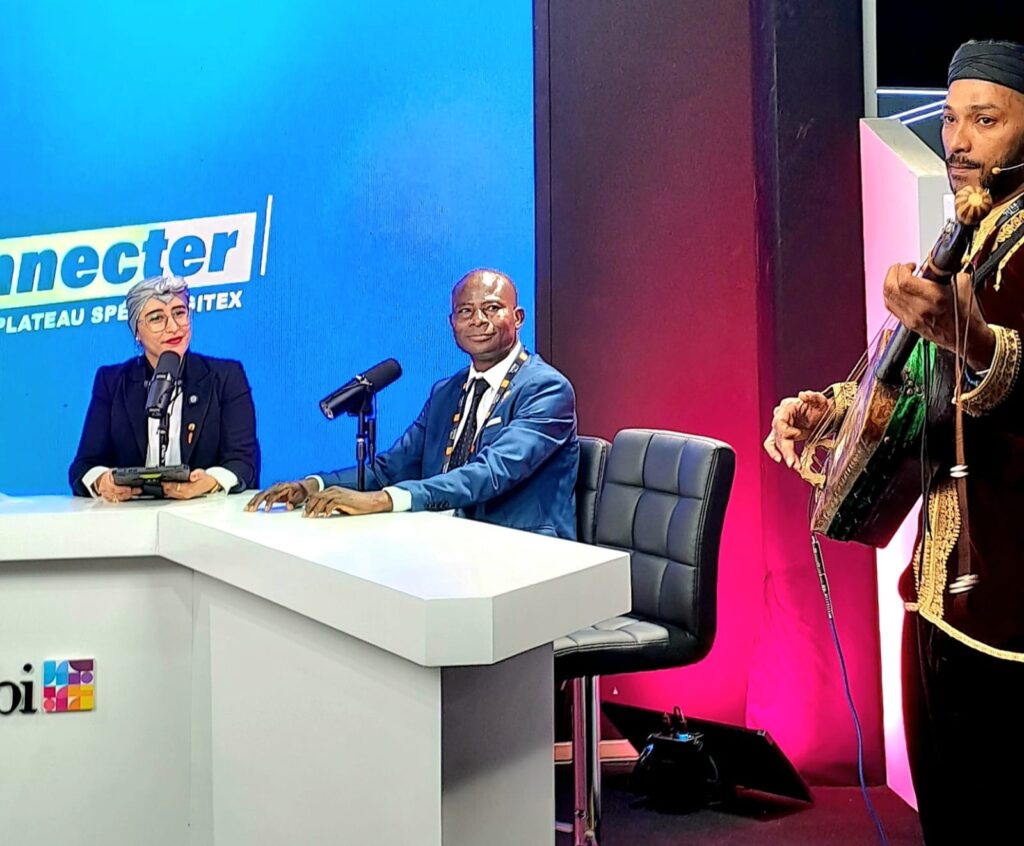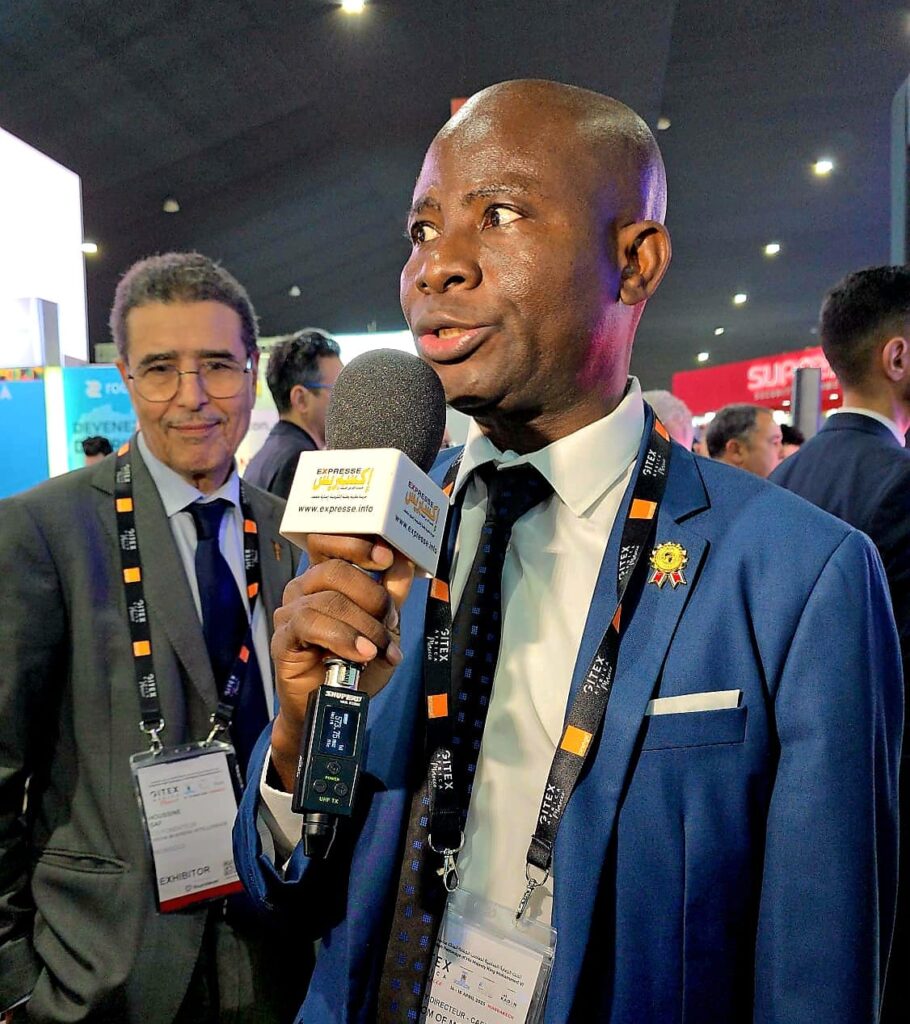CAFRAD, leading new digital and intelligent public governance in Africa

On the occasion of GITEX Africa 2025, a major event dedicated to technological innovation on the continent, and a crossroads of recent innovations linked to the 5th industrial revolution, Doctor Coffi Dieudonné ASSOUVI, Director General of CAFRAD (African Center for Administrative Training and Research for Development), delivered a speech that was both committed and strategic, during his intervention on the program “ça va connecter” live on the set of the program “ça va connecter” live from the stand of APEBI (Federation of Information Technologies, Telecommunications and Offshoring). In a context where the reform of public administration is becoming an essential condition for sustainable development, CAFRAD intends to play a central role in the institutional, human and digital transformation of Africa.
At the outset of his speech, Dr. ASSOUVI expressed his deep gratitude to His Majesty King Mohammed VI, may God assist him, for his constant support to CAFRAD, as well as to the Member States for the confidence that placed in him at the head of this prestigious intergovernmental organization founded in 1962 by African governments with the support of UNESCO. CAFRAD, he recalled, is much more than a training center: it is a pan-African school of excellence, a driver of systemic transformation, and a crucible where the future of African public governance is being built: “CAFRAD is the first Center dedicated to the construction, reinvention (reconstruction of public services in areas of conflict, fragility, insecurity or post-conflict), modernization and continuous improvement of administration, management and governance systems as well as the valorization of the results (innovative practices) of research in comparative administration with a view to solving Africa’s development problems.”, emphasizes Dr. ASSOUVI.

Indeed, in an Africa facing multiple challenges — institutional fragility, lack of administrative efficiency, and inequalities in access to public services — CAFRAD positions itself as a force for both proposals and action. Since his appointment in July 2024, the new Director General has initiated a new momentum, placing CAFRAD at the heart of global and systemic transformation issues: economic, ecological, digital, as well as managerial. The Pan-African Organization aims to harmonize the training systems for African public officials, promote innovative administrative practices, and strengthen skills in service of implementing the African Union’s Agenda 2063 and the United Nations Sustainable Development Goals (SDGs) for 2030.
When asked about the challenges related to connectivity, Dr. ASSOUVI emphasized the magnitude of the issue. Africa still lags significantly in access to the Internet and to digitized public services, due to deep disparities between countries, both in terms of infrastructure and digital coverage. Yet, digital transformation of public administration is a necessity. Achieving this requires massive investment in technological infrastructure, energy, cybersecurity tools, and the development of training policies tailored to African realities. In this context, CAFRAD has launched a broad program to support the construction of smart administrations capable of steering the modernization of states based on precise diagnostics and human-centered policies: “Training and developing skills and talent, including digital talent, is essential. To this end, CAFRAD has implemented a project entitled: Smart Public Administration Construction Project (Smart Government), which includes several components. The first is training, the second is assessing the current state of public administration digitalization and digital transformation, and the third is developing digital transformation policies and strategies based on a human-centered approach.”

Talent Retention in Africa: A Cornerstone of Technological Sovereignty and Sustainable Development
While continuous training is a central issue, motivating skilled individuals to remain in Africa is even more pressing. The African continent is rich in talent, but too often these skills are lost to emigration or, worse, ignored, wasted, or underutilized. To reverse this trend, CAFRAD advocates for a renewed focus on valuing human capital. This means not only better pay and attractive working conditions, but also the creation of real opportunities in cutting-edge sectors, with investment in tech industries capable of absorbing such expertise. Dr. ASSOUVI emphasizes the need to break with neopatrimonialism, which stifles the emergence of new leaders in Africa. According to him, only ethical, visionary, and inclusive governance can foster a climate of trust conducive to talent retention.
“There is, and I believe it, only one way to exterminate a people: the destruction of their educational system, mental enslavement, indoctrination, manipulation of information, and intellectual plundering.
But there is also only one way for a people to destroy themselves: through the neglect (the lack of prioritization and weak investment) of their educational system, the manufacture of yes-men, local tinkerers, false experts and half-educated professionals; through the deliberate orchestration of brain drain; through the illusion of knowledge.”

In parallel, CAFRAD has begun in-depth work to establish strategic partnerships, both with member states and with academic and technological institutions on the continent and beyond. Agreements have been initiated with universities, international development organizations, and private companies to support research, continuing education, skills development, innovation, and the incubation of new ideas. The objective is clear: to make CAFRAD a platform of excellence, capable of offering concrete solutions to the challenges of African development. According to the Director General of CAFRAD, African countries must avoid, at the risk of self-destruction, “the importation of an obsolete and unsuitable educational system, the waste of human resources and talents, as well as the rushed training of senior officials and leaders.”
When asked how to reconcile the continent’s ambitions with the still high level of digital illiteracy, Dr. ASSOUVI responded with clarity and determination. Once again, the answer lies in training. He calls for the implementation of a large-scale regional program for the development of digital talent, so that Africa is not left behind in the Fifth Industrial Revolution. CAFRAD is actively working on a dedicated project focused on ethical artificial intelligence tailored to the needs of African administrations, to anticipate skill obsolescence and build the jobs of the future.
Dr. ASSOUVI’s message is clear and concrete: Africa’s future depends on the profound transformation of its public administration, the empowerment of its talents, and governance based on excellence, ethics, and vision. CAFRAD aims to embody this collective ambition and become the architect of a new digital, resilient, and inclusive Africa.
The Director General concluded his address with a powerful message to the entire continent: “We are determined to anticipate the obsolescence of skills, to train for the jobs and services of the future, so that Africa becomes a dynamic force on the global stage. And we will achieve this—together with all Africans.”





